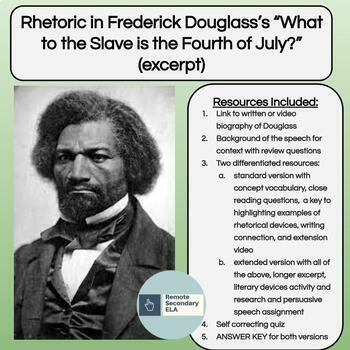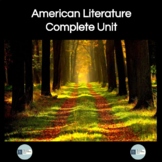What to the Slave is Fourth of July and Rhetoric
- Google Drive™ folder

Also included in
- Teaching American speeches can often be both difficult and somewhat boring for students. This bundle is a full unit, which includes an "Introduction to Understanding Rhetoric" and four American speeches: Patrick Henry's "Speech in the Virginia Convention," an excerpt from Thomas Paine's "Crisis, No.Price $30.00Original Price $35.00Save $5.00
- Frederick Douglass is one of the most important and influential figures in American History. His autobiography Narrative of the Life of Frederick Douglass, An American Slave, Written by Himself and famous speech "What to the Slave is the Fourth of July" are essential pieces that encourage diversityPrice $13.60Original Price $17.00Save $3.40
- Transform American Speeches into Engaging Learning Adventures with this Comprehensive Teaching Bundle!American speeches are essential but often challenging subjects for English and History educators. Embrace a fresh approach with our immersive bundle that brings vitality and enthusiasm to the studyPrice $26.40Original Price $33.00Save $6.60
- Looking for help with your American Literature Unit? This bundle includes everything you need for your entire year. Our resource begins with a Unit for The Crucible, which includes: 1. Excerpts from Ch. 1&2 of The Scarlet Letter with space for annotations, multiple choice assessments, and writinPrice $116.00Original Price $145.00Save $29.00
- Enhance your curriculum with a diverse range of African American literature using our comprehensive bundle. This resource is a treasure trove of materials that will seamlessly incorporate African American voices into your lessons. With this purchase, you'll receive a complete unit focused on non-ficPrice $44.80Original Price $56.00Save $11.20
- Discover an expansive and diverse American Literature bundle featuring an array of engaging resources. Dive into Arthur Miller's powerful play, The Crucible, and explore a rich collection of American poetry, including works from Emily Dickinson, Walt Whitman, Edgar Allan Poe, Robert Frost, Robert HaPrice $260.00Original Price $325.00Save $65.00
Description
This resource focuses on analyzing Frederick Douglass's renowned speech, "What to the Slave is Fourth of July." Students will engage in activities such as reviewing concept vocabulary, exploring Douglass's life, reading background information on the speech, and answering close reading questions. They will also identify and analyze examples of ethos, pathos, and logos, define unfamiliar terms, and identify Douglass's main argument and call to action. In the extended version of this resource, students will delve deeper into the speech, answering 15 additional close reading questions, identifying various literary devices, and analyzing their effectiveness. They will also engage in research, plan an argumentative speech with a thesis, arguments, counterargument and rebuttal, and a call to action. Save time and effectively cater to diverse learners with this comprehensive and differentiated resource.
Included with this resource:
- Pre-reading concept vocabulary (one form for the standard version of the text and another for the extended)
- Link to written or video biography of Douglass
- Background of the speech for context with review questions
- Excerpt from the speech with close reading questions and a key to highlighting examples of rhetorical devices (standard version has 8 close reading questions, extended version has 15 close reading questions)
- Writing connection: identifying Douglass's main argument and call to action
- Extension link to Douglass's descendants reciting excerpts from the speech
- Honors extension: Literary terms analysis (with links to definitions and examples for terms) and Plan to write an argumentative speech
- ANSWER KEY
Pair this with our Frederick Douglass and Paul Laurence Dunbar Synthesis Assignment, which includes an excerpt from Douglass's autobiography and two poems by Paul Laurence Dunbar. Students will read the texts, answer questions, and make thematic connections between the works that culminate in a short essay. An answer key is included.
Also, pair this with our other materials for studying rhetoric: Introduction to Understanding Rhetoric: Ethos, Pathos, Logos, Patrick Henry's "Speech in the Virginia Convention," Thomas Paine's "Crisis, No. 1," and Abraham Lincoln's "Gettysburg Address."








